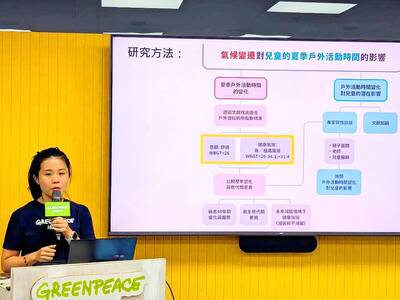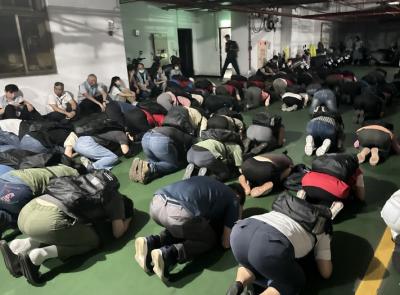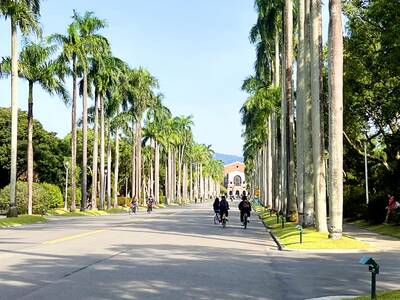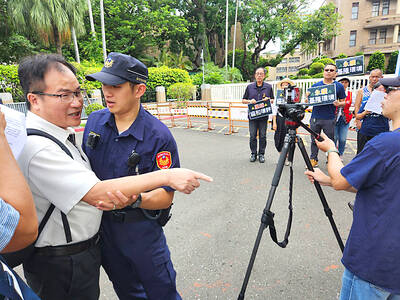The Ministry of Labor yesterday released its latest occupational salary survey, showing that airline pilots earn the highest average monthly income at NT$323,000 (US$10,818).
The annual survey reports full-time employment numbers, average monthly salaries as of July last year and total annual income for 2023.
After pilots, the top earners are actuaries (NT$212,000), doctors (NT$180,000), professional athletes (NT$143,000) and maritime regulators, including harbor pilots (NT$138,000).

Photo: Cheng Wei-chi, Taipei Times
In terms of annual pay, pilots and actuaries continue to lead, while doctors, maritime regulators, telecom engineers, lawyers and athletes all report yearly earnings exceeding NT$1.5 million.
Among managers and supervisors in comparable positions, those in finance and insurance earn the highest average monthly salary at NT$120,000.
In contrast, hospitality managers receive the lowest, averaging NT$51,000 per month.
For professionals, healthcare and social work top the salary list at NT$76,000, followed by finance and insurance (NT$73,000), and transportation and storage (NT$68,000).
Education professionals earn the least at NT$39,000, with those employed in hospitality earning NT$45,000.
Wages for basic technical and labor positions typically range from NT$29,000 to NT$40,000.
The lowest-paying sectors — education, publishing/media, and information and communications technology (ICT) — all average NT$29,000.
Workers in hospitality, manufacturing, scientific services and healthcare average NT$31,000 per month.
The ministry said that salary disparities reflect the unique characteristics of each industry.
Some sectors, including hospitality and education, tend to have smaller wage gaps between roles, while transport, ICT/media and healthcare show wider income variation, it said.
The survey covers full-time domestic and foreign employees in Taiwan’s industrial and service sectors, excluding those employed in agriculture, government, schools, and religious or professional organizations.

The government should improve children’s outdoor spaces and accelerate carbon reduction programs, as the risk of heat-related injury due to high summer temperatures rises each year, Greenpeace told a news conference yesterday. Greenpeace examined summer temperatures in Taipei, New Taipei City, Taoyuan, Hsinchu City, Taichung, Tainan and Kaohsiung to determine the effects of high temperatures and climate change on children’s outdoor activities, citing data garnered by China Medical University, which defines a wet-bulb globe temperature (WBGT) of 29°C or higher as posing the risk of heat-related injury. According to the Central Weather Administration, WBGT, commonly referred to as the heat index, estimates

Taipei and other northern cities are to host air-raid drills from 1:30pm to 2pm tomorrow as part of urban resilience drills held alongside the Han Kuang exercises, Taiwan’s largest annual military exercises. Taipei, New Taipei City, Keelung, Taoyuan, Yilan County, Hsinchu City and Hsinchu County are to hold the annual Wanan air defense exercise tomorrow, following similar drills held in central and southern Taiwan yesterday and today respectively. The Taipei Mass Rapid Transit (MRT) and Maokong Gondola are to run as usual, although stations and passenger parking lots would have an “entry only, no exit” policy once air raid sirens sound, Taipei

Taipei placed 14th in the Quacquarelli Symonds (QS) Best Student Cities 2026 list, its highest ever, according to results released yesterday. With an overall score of 89.1, the city climbed 12 places from the previous year, surpassing its previous best ranking of 17th in 2019. Taipei is “one of Asia’s leading higher-education hubs,” with strong employer activity scores and students “enjoying their experience of the city and often keen to stay after graduation,” a QS staff writer said. In addition to Taipei, Hsinchu (71st), Tainan (92nd), Taichung (113th) and Taoyuan (130th) also made QS’ list of the top 150 student cities. Hsinchu showed the

Environmental groups yesterday filed an appeal with the Executive Yuan, seeking to revoke the environmental impact assessment (EIA) conditionally approved in February for the Hsieh-ho Power Plant’s planned fourth liquefied natural gas (LNG) receiving station off the coast of Keelung. The appeal was filed jointly by the Protect Waimushan Seashore Action Group, the Wild at Heart Legal Defense Association and the Keelung City Taiwan Head Cultural Association, which together held a news conference outside the Executive Yuan in Taipei. Explaining the reasons for the appeal, Wang Hsing-chih (王醒之) of the Protect Waimushan Seashore Action Group said that the EIA failed to address